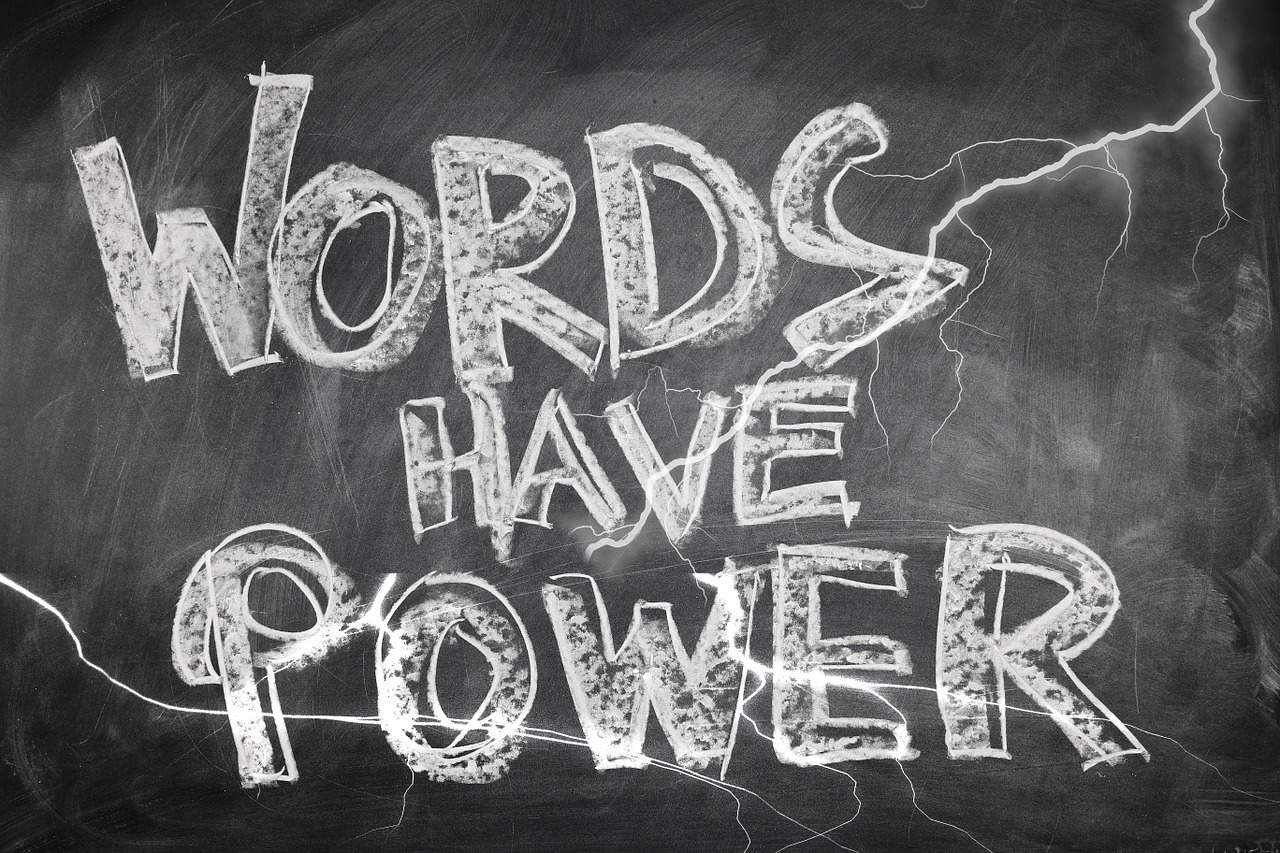Your words have power, which means your words hurt or heal depending on how you choose to use them.
It says in the Ancient Hebrew Scriptures that if we could “control our tongues” (i.e. words) we would be perfect and could also control ourselves in every other way.
It goes on to warn that it (your tongue or words) can set your whole life on fire.
A pretty powerful statement.
Rumi also said,
Raise your words, not your voice. It is rain that grows flowers, not thunder.
Rumi
I think there is much truth in these sentiments.
Your words have the power in that your words hurt or heal beyond what many of us understand.
Right now you have access to a “tool” that can literally save or destroy your marriage. Words.
And what you choose to say and NOT say have the power to change your life in incredible ways.
That’s why Tony Robbins calls the ability to move others with words the most important skill that determines your life and future.

So, let me ask you a simple question right up front:
“Do your words hurt or heal in your marriage and life right now?”
Before you answer too quickly, take a moment to think about it.
Really try to think about the impact your words and how you use them to have on the people around you.
Think about their reactions. Their body language. Facial expressions.
Do they engage you in conversation or try and avoid it?
All these subtle reactions can give you some clue and insight into the impact your words have on others right now.
Let me tell you something that you might not know or even want to hear,
whenever you say something to someone and you get a very loaded and negative reaction, chances are what you said wasn’t the right choice of words in that moment.
It doesn’t mean that what you said wasn’t true, but whenever we don’t get the right response when talking to our loved ones, it’s most likely because we chose the wrong approach.
Sometimes, replacing a few words with another can literally mean the difference between having a civil conversation or a full-blown out-of-control argument.
For example,
Husband 1: “You are completely wrong and don’t have your facts straight about X …”
Husband 2: “I might be wrong about X, but this is what I’ve heard … What did you hear?”
I’m sure you can tell which one has the potential for a positive conversation (even though there is disagreement) and which one would most likely lead to someone sleeping on the couch.
And listen, it’s not just our words that influence those around us … it’s also HOW we say things.
I have found that the HOW is sometimes more influential than the WHAT we say.
It’s like Maya Angelou once said,
“I’ve learned that people will forget what you said, people will forget what you did, but people will never forget how you made them feel.”
The words you use when you express yourself, and how you use them, have a huge impact on those around you.
So it’s important that you start paying attention to how you express yourself; especially to your loved ones.

Whenever I get a certain loaded and explosive reaction from my young son, I know that it’s not all his fault at that moment.
Yes, maybe he needed to be disciplined about something, but the approach and words I choose to discipline are just as important.
What I say and how I choose to say it definitely creates a different reaction in him.
Look, chances are you’ve met someone at some stage in your life that seemed completely unaware of how their words affect others around them.
And maybe some of their words were aimed at you and they stung at that moment.
Maybe they’re still haunting you.
Well, how did (does) that make you feel?
Not great, I suspect.
So let’s turn the tables for a moment and ask: How about you?
Do you use your words to uplift or break people down?
If you’re realising right now that perhaps you would like, or even need to, mend a few fences in your life, then keep on reading because I would like to share with you a few examples of what could be called supportive and healing language.
These would go a long way in helping you build your marriage rather than break it down.
They will also definitely serve you in your business relationships and at work.
People are people and we use language to communicate with one another.
So really, these examples can work in any situation of your choice if you tweak them a little bit.
These phrases and words are powerful because they usually make others feel great and go a long way toward mending relationships that require fixing.

So use them freely.
Just be real and stay authentic when you do.
Everyone can smell BS a mile away when you’re trying to trick them or blow smoke up their arse.
“I’m listening.”
Sometimes, when someone important to you is trying to share their feelings, you might be busy with something else.
If you can switch your attention from what you’re doing to your loved one momentarily, they’ll feel like they really matter to you.
It’s called being “present.”
We live in such a distracted world these days that giving people your presence and attention, speaks volumes and goes a long way in earning you brownie points or credibility/trust.
“I’m sorry.”
One of the most healing things you can do for another person and yourself is to say, “I’m sorry.”
Even if you’ve been stubborn about avoiding saying it, try it out a few times.
It will make you feel like you’re wiping your slate clean of the error you made.
Plus, when your apology is truly sincere, it will encourage you to be warier of your words and actions in the future.
Now, it doesn’t matter how you say “I’m sorry,” but what you do is important.
Sometimes, when I’ve really upset my wife and I know that she’s not in the mood to talk to me right now, I would wait a little bit before sending her a heartfelt apology via text.
Just to break the ice so that I can apologise properly in person.
Other times, I wouldn’t say anything but just simply go and give her a hug when “enough” time has passed.
I think over time we’ve learned what the other one is trying to say through gestures like hugs, so she knows it’s my way of apologising and making amends.
I would also typically feel in the way she reacts to my hug whether she’s open enough for a verbal apology or not.
If she’s not, I would give her more time.
But, regardless of how you do this, that you do it is important.
And by the way, when you admit fault in a business setting to a client, your credibility actually increases.
When you sincerely say, “Look, John, I really messed up and I could have done that a bit better,” you’re actually it off than making excuses or blaming someone/something else… that’s the worst. It makes you look weak.
“I forgive you.”
Getting to the point of forgiving someone can take a lot of time and soul-searching.
In fact, it could take months or years in some cases.
However, when you truly accept and forgive, you are freed from the weight of your hurt, resentment, and anger.
In a real sense, you’re letting yourself off the hook and not so much the other person you felt anger towards before.
It’s about stepping out of the darkness and into the light and taking a new breath.
It’s about taking control back of your life.
It’s a humbling, yet positive experience to forgive others for something they did that upset or even hurt you deeply.

Right now, you have the power to mend an important relationship, or put something in the past in order to move on with your life, by using three simple words: “I forgive you.”
Just make sure those are the three words you need to use right now, and not: “I am sorry.”
“I appreciate what you do.”
According to the Wordbook Dictionary, to appreciate someone is to “value, admire, honour, or take notice of them.”
Wouldn’t it feel great if someone you love or respect told you they appreciated something you did?
When you tell others you appreciate them, they see that you’ve noticed what they do, and everyone wants to feel appreciated.
This one goes a long way.
To begin healing a less-than-satisfactory relationship, add this simple sentence, “I appreciate you” to your vocabulary and use it often.
I would encourage you also to make your appreciation very specific.
Even though saying, “I appreciate you,” saying to someone “I appreciate you for …” is even more impactful.
“I appreciate you for taking so good care of the kids.”
“I appreciate you for working so hard taking care of us.”
“I appreciate you for letting me have a break and going away for a few days.”
“I appreciate you for the effort you put into making our team great.”

“I know you can do it!”
Directly expressing your confidence in someone can buoy spirits and boost their confidence.
When you hear that someone else believes you can achieve something, don’t you begin to believe more in yourself too?
So do others.
Start telling them how much you believe in them.
This is especially true for your kids.
But your wife also needs to hear it.
Your husband definitely needs to hear it.
“I love you.”
When you cherish your close relationships, you’ll want to use caring and supportive words often.
Saying, “I love you” is just about the most emotionally supportive and caring word you can say.
When a loved one is having a tough day or just for no reason at all, these spoken words can bring warmth, joy, and solace.
When you say, “I love you,” it’s a simple expression that transmits so much.
Your connection is strengthened.
Intimacy is triggered.
Trust is deepened.
I found that actually saying the words “I love you” has even more profound meaning than saying it through different means, like a gift for example.
Now, I know that according to Gary Chapman there are five primary love languages, which obviously helps to communicate your love to your spouse in a way that they understand best.
But, using the actual words, “I love you,” still holds significant power I believe.
Also, when’s the last time you actually told your team that you “love” them and what they mean for your business or organisation.
I know we’re talking about a different type of love, but the words still hold great meaning.
Last thoughts
Using “healing language” each day can be one of the most soothing and supportive habits you can develop.
Speaking words like, “I’m listening,” “I’m sorry,” and “I forgive you” heals and deepens relationships.
Saying, “I appreciate what you do,” “I know you can do it,” and “I love you” can turn literally make someone’s day or change their life.
Share your love and joy for life by using language that heals and uplifts the souls of those you care about.
Your kindness will be returned to bring you even more happiness.
Your words have power.
Use them responsibly.
